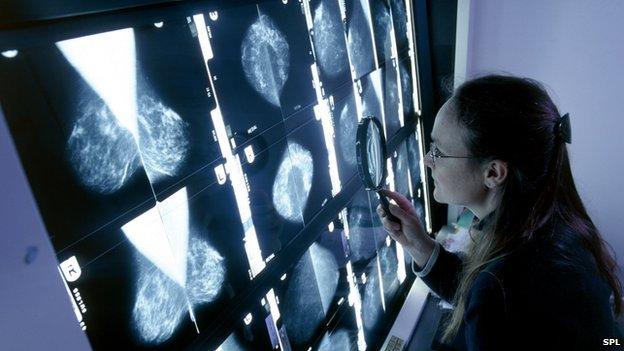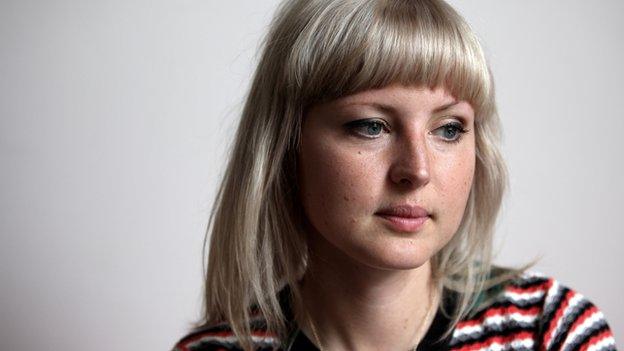Breast cancer drug price reduction urged
- Published
NICE chief executive Sir Andrew Dillon says NHS resources need to be distributed "as fairly as possible"
Campaigners are urging pharmaceutical giant Roche to lower the cost of a pioneering new breast cancer treatment as the NHS drugs watchdog is set to reject its use on cost grounds.
NICE, which sets guidelines for England and Wales, says the £90,000 cost of trastuzumab emtansine is unjustifiable.
The drug can add months of life to women dying of breast cancer, and Roche says the price reflects years of work.
The drug is available in England via the government's Cancer Drugs Fund.
But this scheme will end in 2016, meaning patients in England will no longer be able to get trastuzumab emtansine on the NHS.
One fifth of all breast cancers are of a type that could potentially respond to trastuzumab emtansine treatment.
'Huge blow'
It is designed for women with HER2-receptor-positive cancer that has spread around the body.
The drug seeks out and destroys cancerous cells, attacking them from within. Its novel action means it is unlikely to cause the side effects, such as hair loss, seen with many other types of chemotherapy.

For advanced cancer, the aim is remission rather than cure
In trials, trastuzumab emtansine - which is sold under the brand name Kadcyla - extended the lives of women by almost six months.
Prof Paul Ellis, consultant oncologist at King's College London, has been treating his patients with the drug.
He said: "Kadcyla represents a significant advance in HER2-positive breast cancer, so for NICE to issue negative preliminary guidance is a huge blow."
Sir Andrew Dillon, NICE chief executive, said: "We had hoped that Roche would have recognised the challenge the NHS faces in managing the adoption of expensive new treatments by reducing the cost of Kadcyla to the NHS.
"We hope the manufacturer will act in the best interests of patients and use this consultation period to look again at their evidence and consider if there is more they can do."
Jayson Dallas, general manager at Roche Products, said: "Roche is extremely disappointed that NICE has failed to safeguard the interests of patients with this advanced stage of aggressive disease."
Unless the cost comes down, Kadcyla will be the third breast cancer drug made by Roche to have been rejected by NICE based on cost versus benefit.
System 'can't keep up'
A Department of Health spokesman said stakeholders would have the opportunity to respond to the recommendations set out in the draft guidelines for England and Wales.
Dr Caitlin Palframan, of the charity Breakthrough Breast Cancer, said that the drug appraisal process and the cost of drugs must change if prospects for patients were going to improve.
"Drug development and research is moving at a pace that the system can't seem to keep up with.
"We are now looking to the Department of Health and the pharmaceutical industry to find a way to work together to bring the cost of expensive drugs down and put a sustainable system in place by which new treatments can be made available on the NHS on a routine basis.
"Until then it appears NICE will be forced to reject these cutting-edge treatments, some of which are capable of providing women facing terminal breast cancer diagnoses with extra time with their loved ones, which is the very least they deserve."
The charity estimates some 1,500 women in Britain could benefit from Kadcyla every year.
Emma Pennery, clinical director at Breast Cancer Care , of Breast Cancer Care, said: "We recognise that decisions about approval of cancer drugs are based on many complex factors, but we are concerned by the increasing number of people we support telling us how anxious they are about being able to access treatments when they need them.
"We await the results of the consultation period and the final guidance from NICE and hope Kadcyla will become widely available for eligible patients."
The Scottish Medicines Consortium, which considers drugs for use by the NHS in Scotland, is due to discuss the drug, external but has not yet set a meeting date.
Northern Ireland's Department of Health, Social Services and Public Safety considers NICE's guidance after it is issued, external, so it could adopt the decision made for England and Wales or set a different policy for trastuzumab emtansine.
- Published7 August 2014

- Published25 March 2014
